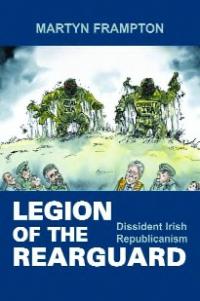Legion of the rearguard: dissident Irish republicanism
Published in 20th-century / Contemporary History, Book Reviews, Issue 4 (July/August 2011), Reviews, Volume 19
Legion of the rearguard: dissident Irish republicanism
Martyn Frampton
(Irish Academic Press, £15.19/€17.28)
ISBN 9780716530558
Martyn Frampton’s Legion of the rearguard is an attempt to come to terms with the veritable alphabet soup of ‘dissident’ (itself a contested term) Irish republicanism. His contribution is the first major work on the subject since Mooney and O’Toole’s Black operations: the secret war against the Real IRA, now almost ten years old and much more journalistic than Frampton’s book.
A glance at the bibliography for Legion of the rearguard reveals the extent to which the author has relied on the press releases and speeches of those dissident organisations analysed, as well as contemporary mainstream newspapers and magazines. Aside from this, it is quite heartening to see that websites are coming into their own as reputable sources in historical studies, given their widespread use as disseminators of party and organisational policy these days.
In his opening chapter on the twentieth-century history of Irish republicanism Frampton does a good job, particularly in not pushing a hierarchy of motivations for the emergence of the Provisionals in 1969–70, be it doctrinal purity or armed pragmatism. In dealing with the later split with Republican Sinn Féin in 1986 over the issue of southern abstentionism, Frampton is again quite clued-in as to the underlying reasons. His subchapter here on the Continuity IRA fails, however, to adequately explain that group’s inability to bring any substantial numbers of Provisional IRA volunteers with it following the split.
Much of the later work on post-Good Friday Agreement republicanism has been covered in Mooney and O’Toole’s book, albeit not with the same degree of scholarly analysis provided here. In the chapter entitled ‘The nadir of dissident republicanism, 2002–6’ Frampton gives an illuminating insight into what might be termed the ‘intelligentsia’ of dissidence, particularly Anthony McIntyre’s tireless online critique of the Provisional republican movement, The Blanket: a journal of protest and dissent, which did much to highlight the treatment meted out to those who dissented from mainstream republicanism. This chapter also serves to highlight the bankruptcy of the dissidents in formulating any genuine alternatives to the situation in Northern Ireland currently—imperfect as that is.
Frampton also deals with the vigilante aspect of republicanism in the past decade, be it the Republican Action Against Drugs (RAAD) in Derry or the Real IRA’s campaign against drug dealers in Cork city in recent years. It is to the author’s credit that he does not engage in baseless accusations of such criminality within these dissident groupings that has become a feature of the mainstream media; only where cases are substantiated does he make any such connections. Frampton does seem to have a minor obsession with the socialist-republican group Éirigí and the possibility that they may be connected to militarism of some kind. Despite noting the group’s own insistence on their position that ‘armed struggle’ has no place at this time, that it has ‘no use’, Frampton throws in quite a few sentences such as ‘This less-than-forthright rejection of violence . . .’.
One shortcoming of the book is its failure to deal with the issue of informing or ‘touting’ to any significant degree beyond the McKevitt–Rupert case. Given the extent to which Real and Continuity IRA operations have been disrupted, members arrested and arms found, one would think that this issue would be deserving of a chapter of its own (chapters are arranged chronologically). That he titles a chapter on recent years ‘The flame reignites: resurgence, 2006–10’, emphasises to some extent the degree to which modern scholars and journalists buy into this notion of resurgence. The Sunday Times and Sunday Tribune have both carried stories along such themes in the past two years, with very little other than the word of militant republican ‘spokespersons’ to back them up—certainly no violence to compare with even the less-violent years of the Provisional IRA’s campaign.
Although the book does contain a considerable number of primary sources, the dearth of interviews is a real disappointment and a shortcoming. For a book with almost 300 pages, only eight people are interviewed, at least three of whom I could not see contributing any new insights or information that are not already in the public domain—Ruairí Ó Brádaigh, Danny Morrison and Seán O’Callaghan. And it is here that I have my strongest objection: the reliance on Seán O’Callaghan for any new or genuine information. Such is Frampton’s indebtedness to O’Callaghan that he places him alone of all his sources in the ‘Acknowledgements’ section. Citing his contribution to the book as ‘invaluable’ and acknowledging that O’Callaghan helped in the shaping of the book, Frampton is effectively plastering a ‘Warning’ sticker on his work. Since O’Callaghan defected from the Provisional IRA over twenty years ago, it is remarkable that he would have had such input into a book dealing, in the main, with the post-1997 period. Beyond this, his claims of seniority within the Provisional IRA are widely disputed, and his declarations have grown more fantastical as time passes.
Overall, the book is worth the read, particularly given the scarcity of comprehensive information on the subject of dissident Irish republicanism at the moment. Through no fault of its author, the book does suffer from the constant shifting of loyalties within Irish republicanism (Republican Sinn Féin has split since the book’s publication). In time it may be considered a valuable general source on the period and the subject but, given its lack of genuine insight into the murky world beyond what is already all public information, I doubt whether the Special Branch will be in possession of a well-thumbed copy. HI
Gearóid Ó Faoleán is a Ph.D student at the University of Limerick.
















